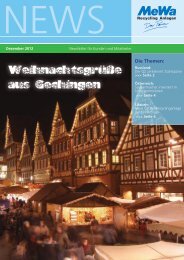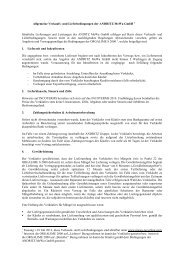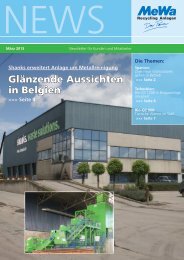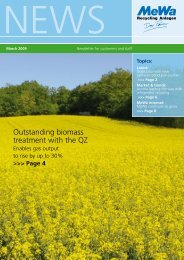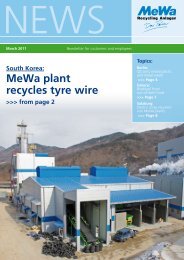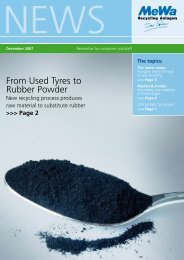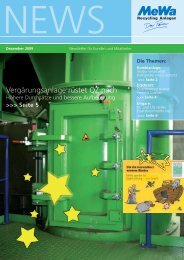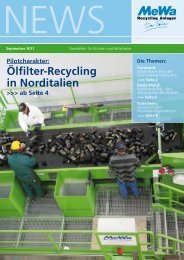Careful spin - MeWa Recycling Maschinen und Anlagenbau GmbH
Careful spin - MeWa Recycling Maschinen und Anlagenbau GmbH
Careful spin - MeWa Recycling Maschinen und Anlagenbau GmbH
You also want an ePaper? Increase the reach of your titles
YUMPU automatically turns print PDFs into web optimized ePapers that Google loves.
NEWS<br />
April 2008 Newsletter for customers and staff<br />
New machine for electronic waste:<br />
<strong>Careful</strong> <strong>spin</strong><br />
>>> Page 2<br />
The topics:<br />
<strong>MeWa</strong> International:<br />
Tyre recycling in Kazakhstan<br />
>>> Page 5<br />
Market & trends:<br />
The separation of refuse<br />
scrap is becoming lucrative<br />
>>> Page 6<br />
Refuse-derived fuels (RDF)<br />
are gaining in attractiveness<br />
across Europe<br />
>>> Page 8
Latest news<br />
<strong>Careful</strong> <strong>spin</strong><br />
A new dismantler for electric and electronic appliances<br />
The latest product<br />
developed by <strong>MeWa</strong><br />
promises to disassemble<br />
electric and electronic<br />
waste gently. During the<br />
disassembly, the Smash<br />
Boom Bang (SB 2 ) leaves<br />
contaminated parts such<br />
as condensers and batteries<br />
intact. That way, they<br />
can be sorted out<br />
without problems.<br />
Waste skip – the end of the line. In accordance<br />
with the WEEE directive, electric and<br />
electronic waste no longer goes to landfill,<br />
but is collected in special skips.<br />
Throwing mechanism.<br />
According to the EU directive<br />
on WEEE (Waste Electrical and<br />
Electronic Equipment) passed in<br />
2005, all discarded electric and electronic<br />
appliances have to be introduced into<br />
the recycling process. In Germany alone,<br />
industry expects a future volume of<br />
more than 1 million tonnes of electric and<br />
electronic waste.<br />
The WEEE directive became legally<br />
binding in Germany in March 2006. Since<br />
then, containers for old appliances are<br />
provided at the predominantly municipally<br />
owned civic amenity sites.<br />
<strong>MeWa</strong>‘s Smash Boom Bang is specially<br />
designed for this fraction. This new<br />
dismantler does away with the need<br />
for time- and labour-intensive manual<br />
pre-dismantling of electric appliances.<br />
In a very short time, the innovative SB 2<br />
dismantles the electronic waste. The<br />
separated fractions, such as plastic parts,<br />
circuit boards, cables, electric motors,<br />
The new Smash Boom Bang<br />
dismantles appliances with<br />
gentle force.<br />
This is how the SB² works<br />
The electric and electronic waste is<br />
fed into the turning drum of the Smash<br />
Boom Bang. Actuators mounted on<br />
the inside of the drum move the waste<br />
material upwards; it then drops back<br />
from a certain height.<br />
A throwing mechanism located in<br />
the centre of the machine retrieves and<br />
transformers or other composite metal<br />
assemblies are ready for sale or for further<br />
processing. Contaminated parts, on the<br />
other hand, can be easily sorted out.<br />
The Smash Boom Bang is a particularly<br />
economical and compact pre-dismantling<br />
machine. It is particularly suited for<br />
audio systems, household appliances,<br />
computers, printers and scanners. The<br />
separated fractions are easy to sell on,<br />
while remaining assemblies can be further<br />
disassembled in other machines, such as<br />
the <strong>MeWa</strong> Cross-Flow Shredder QZ.<br />
The disassembly technology of the<br />
SB 2 makes it a very compact piece of<br />
equipment. Its noise output is below 80<br />
dBA. The SB 2 can thus be erected in any<br />
factory hall without the need for additional<br />
building measures. ■<br />
accelerates the falling material and<br />
throws it up again. The waste material<br />
then hits the casing which causes it to<br />
break up.<br />
In that way, the SB 2 dismantles<br />
appliances most efficiently, i.e. in a<br />
short time and without unnecessary<br />
force. And also with very little wear.<br />
<strong>MeWa</strong>-News April 2008
New plant to recycle fridges brings<br />
a fresh breeze to the Austrian market<br />
From 2009, old fridges and freezers will be processed in Kematen in Lower Austria. Most exciting,<br />
though: For the first time ever in Europe, a waste collection operator will take the processing of old<br />
appliances into their own hands.<br />
This is indeed a new development<br />
in Europe. For the first time ever,<br />
a company with responsibility<br />
for the collection and recycling system<br />
in a particular geographical area gets<br />
actively involved<br />
in the running of<br />
a recycling plant.<br />
For this task, the<br />
Austrian UFH Holding<br />
company has<br />
gone into partnership<br />
with Remondis,<br />
a renowned specia-<br />
Dr. Helmut Kolba list and fifth-largest<br />
provider of recycling services in the world.<br />
Remondis’s share in the joint venture will<br />
be 49 %, while UFH retains the majority<br />
with 51 %.<br />
The current monopoly<br />
The deciding factor for the unusual<br />
step taken by UFH is the current market<br />
situation in Austria. “Our joint venture<br />
breaks the monopoly which currently<br />
<strong>MeWa</strong>-News April 2008<br />
exists in this market”, states Dr Helmut<br />
Kolba, Managing Director both of UFH<br />
Holding and the newly fo<strong>und</strong>ed UFH REcycling<br />
<strong>GmbH</strong>.<br />
In their search for a suitable equipment<br />
provider for the disposal of refrigeration<br />
appliances, Austria’s<br />
strict environmental<br />
standard played a major<br />
part, e.g. regarding the<br />
recovery of CFCs. Other<br />
desired criteria were efficient operation<br />
and clean output fractions.<br />
After research lasting more than two<br />
years, these criteria led to a Type QZ <strong>MeWa</strong><br />
Cross-Flow Shredder with cryogenic CFC<br />
separation.<br />
“The latest <strong>MeWa</strong> technology is<br />
massively different from that of its current<br />
competitors”, is the positive view of Dr<br />
Kolba in an interview with the Austrian<br />
specialist journal Elektrojournal. Currently,<br />
“Our customers<br />
benefit from lower<br />
prices“<br />
Latest news<br />
UFH has contracted the disposal of the<br />
collected cooling appliances to a company<br />
employing traditional shredder technology.<br />
However, operating costs are<br />
significantly higher than those of the<br />
<strong>MeWa</strong> processing concept.<br />
In addition, the new operators also<br />
expect fractions that<br />
are absolutely pure<br />
and thus saleable at<br />
premium prices. The<br />
ever-increasing demand<br />
for secondary raw material was one of<br />
the reasons for their decision in favour<br />
of <strong>MeWa</strong>.<br />
It is envisaged that savings due to<br />
increased efficiency will later be passed<br />
on to the consumer. Managing Director Dr<br />
Helmut Kolba promises: “Our customers<br />
will benefit from the lower prices”.<br />
From next year, the new plant in<br />
Lower Austria is expected to process up to<br />
350,000 fridges and freezers a year. ■
<strong>MeWa</strong>-International<br />
Electric and electronic dismantling<br />
with a single appliance<br />
Wincanton expands by building a fully automatic plant<br />
WEEE recycling to meet the highest standards: In the English Midlands, a fully automatic plant is going to be built to ensure the highest<br />
output quality.<br />
It was only two years ago that the<br />
Wincanton Group, which is active<br />
across all of Europe, started operating<br />
a <strong>MeWa</strong> recycling plant for electric and<br />
electronic waste in the north of England.<br />
This plant had already been designed<br />
for compliance with the WEEE directive<br />
which came into force in the UK on<br />
1 July 2007.<br />
All it takes is a single machine<br />
Now barely a year after the successful<br />
launch of that plant, the logistics<br />
company has decided to “make a<br />
significant investment in this market”, as<br />
announced at the end<br />
of March by Gordon<br />
Scott, Wincanton‘s<br />
Managing Director.<br />
“With the new location and <strong>MeWa</strong>’s<br />
completely new processing concept,<br />
Wincanton demonstrates its commitment<br />
to recycling in compliance with the WEEE<br />
directive. Our capability for offering<br />
a nationwide service for processing,<br />
sorting and the entire recycling process<br />
is much enhanced with this new plant<br />
in the Midlands”, the Wincanton MD<br />
continued.<br />
“We are committed<br />
to the WEEE directive“<br />
This step has been made possible with<br />
a fully automatic plant designed by <strong>MeWa</strong><br />
for an annual throughput of 100,000<br />
tonnes of electric and electronic waste.<br />
The special aspect of this operation: all it<br />
takes is a single machine to dismantle all<br />
of this electric and electronic waste. All of<br />
the work will be done by a <strong>MeWa</strong> 2500<br />
HD Cross-Flow Shredder.<br />
In subsequent processing steps,<br />
high-grade plastics, circuit boards from<br />
computers and appliances, stainless<br />
steel, cables, electronic waste, aluminium<br />
or even magnets are<br />
automatically sorted<br />
out and separated.<br />
Only four to six<br />
employees per shift are required to look<br />
after this efficient machine and to ensure<br />
its smooth operation. The recycling plant<br />
near Birmingham is envisaged to start<br />
operating from the end of 2008. ■<br />
Wincanton, experts in<br />
logistics, want to expand<br />
their activities in the<br />
recycling of electric and<br />
electronic waste to cover<br />
all of England. To that end,<br />
they are building a fully<br />
automated plant, in order<br />
to achieve a higher ratio<br />
of recovery of reusable<br />
material and higher-quality<br />
output at lower operating<br />
costs. And all of this<br />
can be achieved by a single<br />
dismantling machine.<br />
About the company<br />
Wincanton operates across all of<br />
Europe as a leading provider of<br />
specialist logistical and distribution<br />
services. In figures: 30,000 employees,<br />
400 locations, an annual turnover of<br />
2.8 billion euros.<br />
<strong>MeWa</strong>-News April 2008
The innovative Kazakhstan –<br />
tyre recycling in Eurasia<br />
At first glance, Kazakhstan with its<br />
expansive tracts of land, is mainly<br />
dominated by agriculture.”<br />
This is how Ulrich Hink and Wolfgang<br />
Lautenbach described their impressions of<br />
the Central Asian country. Equally striking,<br />
though, to their eyes were the country‘s<br />
development potential and the general<br />
spirit of optimism. The Eurasian country<br />
which borders on both Russia and China<br />
boasts extensive oil and gas fields as well<br />
as other raw material deposits.<br />
An average annual economic growth<br />
of more than 8 % is standard in the world‘s<br />
seventh largest country. The pragmatic and<br />
focused way in which the Kazakhs deal<br />
with this economic boom is evident in their<br />
capital city. It was only in 1997 that the<br />
central city of Astana became the country‘s<br />
Tyre mountains exist even in thinly populated<br />
Kazakhstan.<br />
<strong>MeWa</strong>-News April 2008<br />
capital city. Since then, its population has<br />
more than doubled to 700,000 inhabitants.<br />
Everywhere new buildings shoot up, both<br />
for administration and accommodation.<br />
Companies of Western standards get<br />
established in modern industrial estates.<br />
In this environment of optimism and<br />
progress, the two entrepreneurs expect a<br />
market with a promising future. They want<br />
to process old tyres into rubber granules,<br />
a high-quality secondary raw material. To<br />
achieve this aim, the cousins, both with<br />
a backgro<strong>und</strong> in the steel industry, will<br />
commission a complete <strong>MeWa</strong> recycling<br />
plant. In future, Kazakhstan Rubber <strong>Recycling</strong><br />
will process tyres of both cars and<br />
lorries into a granulate with a grain size of<br />
less than 4 mm, guaranteed to be free of<br />
steel and textile fibres. This material can<br />
then be used to produce moulded products<br />
for use in road building or it can be added<br />
to asphalt.<br />
Apart from the formal negotiations,<br />
Ulrich Hink and Wolfgang Lautenbach<br />
experienced Kazakh hospitality with<br />
the invitation to visit the wonderful<br />
snow-covered landscape of the wide<br />
steppe. Fortunately, temperatures were<br />
comparatively mild at only minus seven<br />
degrees, in contrast to the more usual<br />
minus thirty in winter. Good for the<br />
asphalt and good for travelling Central<br />
Europeans! ■<br />
<strong>MeWa</strong>-International<br />
In Kazakhstan, a complete<br />
tyre recycling plant providing<br />
pre-shredding and granulation<br />
is currently <strong>und</strong>er construction.<br />
<strong>MeWa</strong> accountants Ulrich Hink<br />
and Wolfgang Lautenbach<br />
paid a visit for talks with<br />
local representatives. They<br />
were met by friendly people<br />
with outstanding hospitality,<br />
a landscape of breathtaking<br />
beauty and an up-and-coming<br />
nation.<br />
In front of the newlybuilt presidential<br />
palace in Astana.<br />
Kazakh hospitality: Wolfgang Lautenbach<br />
flanked by business partners from Astana.<br />
Extreme temperature differences between<br />
icy cold winters and hot summer months<br />
are the cause of frequent damage to road<br />
surfaces (right).<br />
The <strong>MeWa</strong> plant turns old tyres into granulate<br />
free from contaminants and impurities.<br />
This can be added directly to the asphalt<br />
of the surface course to compensate for<br />
the extreme variations in temperatures.
Market & trends<br />
High prices for scrap make<br />
the separation of refuse<br />
scrap even more attractive.<br />
The Scherrieble Group<br />
has chosen a particularly<br />
lucrative approach. The<br />
result: absolutely pure and<br />
high-quality iron scrap.<br />
Clean separation of refuse scrap<br />
<strong>Recycling</strong> in Germany is traditionally<br />
<strong>und</strong>erstood as follows: householders<br />
collect paper, glass, PET<br />
bottles, aluminium and tin-coated steel.<br />
These materials can be directly returned<br />
to the production process.<br />
The remaining general refuse contains<br />
an unloved mix of rubbish and metal. The<br />
first task is for this mix to be separated out.<br />
The steel fraction, in particular, is separated<br />
A clear separation: RDFs and metal scrap<br />
from commercial waste.<br />
out using magnetic separators. However,<br />
these magnetic systems inevitably also<br />
attract large quantities of textiles, plastic<br />
films and other materials. In that state,<br />
this fraction cannot be sold on as scrap.<br />
Instead, it has been common practice so<br />
far to feed it into incineration plants at a<br />
considerable additional payment.<br />
Additional payment is turned into<br />
profit<br />
High scrap prices have been the<br />
motivator for the Scherrieble Group with<br />
sites in Esslingen and Mannheim to look<br />
for a new approach.<br />
In their search for a suitable process<br />
to separate the steel fraction cleanly from<br />
the mix, the Scherrieble Group came<br />
across the opportunities offered by the<br />
<strong>MeWa</strong> QZ Cross-Flow Shredder. What<br />
Refuse scrap is the name given to<br />
the special mixed fraction of iron steel<br />
and waste which is separated out from<br />
domestic and commercial waste using<br />
magnetic separators. Other materials<br />
such as textiles or plastic films get<br />
What is refuse scrap?<br />
ultimately convinced company owner<br />
Gunter Scherrieble to invest were “the<br />
system advantages of shredding, <strong>MeWa</strong>‘s<br />
many years of experience in the field and<br />
the suitability of the planned equipment<br />
which had proven its worth in several test<br />
runs”.<br />
<strong>MeWa</strong>‘s QZ turns a former loss maker<br />
into a profitable business. The appliance<br />
separates the refuse scrap with 100%<br />
accuracy. The iron steel and the smaller<br />
proportion of non-ferrous fraction can<br />
then be sold on the market at a profit. The<br />
remainder is further processed to refusederived<br />
fuels (RDFs).<br />
The amount of refuse scrap processed<br />
by the QZ at the company‘s site in Esslingen<br />
equates to an annual throughput of about<br />
15,000 tonnes. ■<br />
trapped in the scrap and are separated<br />
out as well. The end result is cleaned<br />
steel fraction with pulverised textile and<br />
plastic. Separating this mix out is the<br />
task of the QZ.<br />
<strong>MeWa</strong>-News April 2008
Refuse-derived fuels (RDF) gain in attractiveness<br />
Processing plants are on the advance all over Europe<br />
Since 2005, it has been forbidden<br />
in Germany to deposit domestic or<br />
commercial waste in landfill sites.<br />
All waste is initially separated into<br />
organic and non-organic fractions. The<br />
organic waste is treated in an anaerobic<br />
digester and then further processed for<br />
composting. The first processing step for<br />
the non-organic fraction is the separation<br />
of materials such as metal, wood and<br />
paper. These can be sold on directly.<br />
The remainder is a highly calorific mix<br />
of materials, first and foremost plastic<br />
packaging materials and plastic films,<br />
– A Universal Rotary Sheare UC pre-shreds the waste on arrival<br />
– Air separation with compressed air is used to separate the heavy from the light materials<br />
– In addition, a mechanical vibrator separates the materials even more finely into different calorific fractions<br />
– In a final preparatory step, an optical unit removes materials containing chlorine from the flow<br />
– The remaining material is then processed into RDF in the Universal Granulator UG<br />
– During the entire process, metal separators are used to separate out various metal fractions<br />
The granulators used by <strong>MeWa</strong> in the<br />
processing of domestic and commercial<br />
waste as RDF are a sophisticated and<br />
well-engineered product. Despite the<br />
light weight of the input material,<br />
they guarantee a high throughput at<br />
<strong>MeWa</strong>-News April 2008<br />
The consumption of<br />
natural gas and crude oil<br />
is rising across the globe.<br />
The natural reserves<br />
are diminishing. Prices<br />
are rocketing sky-high.<br />
An alternative are fuels<br />
derived from commercial<br />
and domestic refuse:<br />
combustible materials with<br />
high energy content. To<br />
produce heat and electricity<br />
in industry and power<br />
stations.<br />
A granulator emits the homogeneously<br />
shredded RDF fraction.<br />
but also mattresses and carpets. A special<br />
market for these materials has developed<br />
as an alternative to expensive<br />
refuse incineration.<br />
They are processed<br />
into refuse-derived<br />
fuel (RDF).<br />
It is the task of the<br />
recycling plants to separate<br />
and process these highly<br />
calorific materials in such a way<br />
that they can be added directly<br />
to fuels such as coal, oil or gas. In<br />
particular, RDFs are burnt in furnaces<br />
This is how RDF processing works in a <strong>MeWa</strong> plant<br />
small mesh sizes. This results in very<br />
homogenous grain sizes, ideally suited<br />
for use in industry and power stations.<br />
With 15 years of experience in<br />
this field and numerous plants already<br />
operational in Germany, projects for<br />
Market & trends<br />
in the cement industry, in steelworks or in<br />
large power stations.<br />
With the cost of oil and gas rising,<br />
the process is becoming ever more<br />
attractive – all over Europe. Currently,<br />
waste processors still have to pay<br />
cement companies for burning the<br />
fuel in their furnaces. However, that<br />
is expected to become less and less<br />
common. The prerequisite for this,<br />
though, is a refuse-derived fuel of high<br />
quality. Once the homogenous material<br />
– i.e. processed to a standard size –<br />
also meets the threshold values for<br />
the emission of pollutants in waste air,<br />
it will have the chance of becoming a<br />
long-term market commodity. ■<br />
further plants across Europe are <strong>und</strong>er<br />
way. Just one example: the British Shanks<br />
Group will soon start operating a <strong>MeWa</strong><br />
RDF plant in Belgium.
<strong>MeWa</strong> internal<br />
Congress attendees impressed with <strong>MeWa</strong> plant<br />
Participants from five continents met<br />
in January for the 7th International<br />
Electronics <strong>Recycling</strong> Congress (IERC)<br />
in Salzburg. The highlight of the last<br />
day of the IERC was a visit to the<br />
Elektronik Altgeräte <strong>Recycling</strong> West<br />
<strong>GmbH</strong> Höpperger.<br />
Following a technical introduction<br />
by Harald Höpperger (Managing<br />
Director of Höpperger <strong>Recycling</strong>)<br />
and Helmut Oberguggenberger (<strong>MeWa</strong><br />
Managing Director) into the operation of<br />
the recycling plant, over 60 visitors from<br />
the IERC were taken on a detailed guided<br />
tour of the site.<br />
In 2004, <strong>MeWa</strong> designed the plant for<br />
an annual capacity of 17,000 tonnes and<br />
provided the complete installation.<br />
Tyrolean music with the “Rietzer Buam” – the lads from Rietz.<br />
CREATING THE FUTURE<br />
M A C H I N E S P L A N T S P R O C E S S S O L U T I O N S<br />
Smiles despite the bad weather: the visit to Höpperger <strong>Recycling</strong> was much enjoyed<br />
by attendees at the International Electronic <strong>Recycling</strong> Congress.<br />
The heart of this recycling plant for<br />
electronic waste in the Austrian town<br />
of Pfaffenhofen is<br />
the <strong>MeWa</strong> Cross-<br />
F l o w S h re d d e r<br />
QZ 2000. The visitors<br />
were most<br />
impressed to see<br />
the plant operating<br />
at capacity and also<br />
by the quality of its<br />
output. The guests<br />
let the material run<br />
through their hands,<br />
<strong>MeWa</strong> at IFAT<br />
The IFAT 2008 trade fair from 5 to 9<br />
May in Munich is drawing closer. Mewa<br />
<strong>Recycling</strong> <strong>Maschinen</strong>- <strong>und</strong> <strong>Anlagenbau</strong><br />
<strong>GmbH</strong> will be present at the world‘s largest<br />
specialist international trade fair for the<br />
environment and waste management with<br />
a 480-sq m stand. <strong>MeWa</strong> will display its<br />
entire range of machinery and appliances.<br />
Centre stage at the stand in Hall C2,<br />
Stand 425/524 will be the Smash Boom<br />
Bang, the new dismantler for electric and<br />
electronic waste. ■<br />
and they all agreed its high degree of purity<br />
made it ideal for selling on the market.<br />
The day finished in great spirits with<br />
hearty Tyrolean specialities, accompanied<br />
by the local “Rietzer Buam” band with<br />
their true Tyrolean so<strong>und</strong>, and was also<br />
the conclusion of a most successful fourday<br />
event. ■<br />
Impressum<br />
<strong>MeWa</strong>-News<br />
Publisher:<br />
<strong>MeWa</strong> <strong>Recycling</strong> <strong>Maschinen</strong> <strong>und</strong><br />
<strong>Anlagenbau</strong> <strong>GmbH</strong><br />
Gültlinger Straße 3, 75391 Gechingen<br />
Tel. 0049 (0)7056 925-0<br />
E-Mail: info@mewa-recycling.de<br />
Editors: Harald Pandl (in charge),<br />
Marius Hörrmann<br />
Print: Druckhaus Weber <strong>GmbH</strong>,<br />
Althengstett<br />
Design: <strong>MeWa</strong> in cooperation with<br />
Creativ-Werbung M. Dostal, Tiefenbronn<br />
Title picture: <strong>MeWa</strong> QZ Cross-Flow<br />
Shredder at work for the Scherrieble<br />
Group, Esslingen<br />
Photograph credits: <strong>MeWa</strong>, UFH (Page 3)<br />
Publication frequency: 4 x per year<br />
<strong>MeWa</strong>-News April 2008



